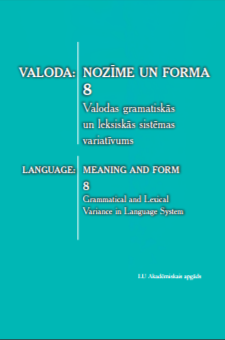Local meaning in the two-year-old and three-year-old children’s speech
Local meaning in the two-year-old and three-year-old children’s speech
Author(s): Ilze Auziņa, Kristine Levane-Petrova, Baiba SauliteSubject(s): Language studies, Semantics, Cognitive linguistics
Published by: Latvijas Universitātes Akadēmiskais apgāds
Keywords: children’s speech corpus; language acquisition; local meaning;
Summary/Abstract: The aim of this article is analyze the ways how the local meaning has been expressed in the children’s (aged 18 to 42 months) speech. What grammatical categories are often used? The speech data from the first Morfoloģiski marķēts longitudināls bērnu runas korpuss (Annotated longitudinal Latvian children’s speech corpus) are used. The corpus is created during the research project Latvian language in monolingual and bilingual acquisition: tools, theories and applications and includes orthographically and morphologically annotated audio recordings of 17 to 44 months old children’s speech. It was concluded that for the expression of local meanings the adverbs, locative case, prepositional phrases and prefixal verbs are often-used, but all these forms do not appear in the children’s speech simultaneously.
Journal: Valoda: nozīme un forma
- Issue Year: 2017
- Issue No: 8
- Page Range: 129-139
- Page Count: 11
- Language: English

